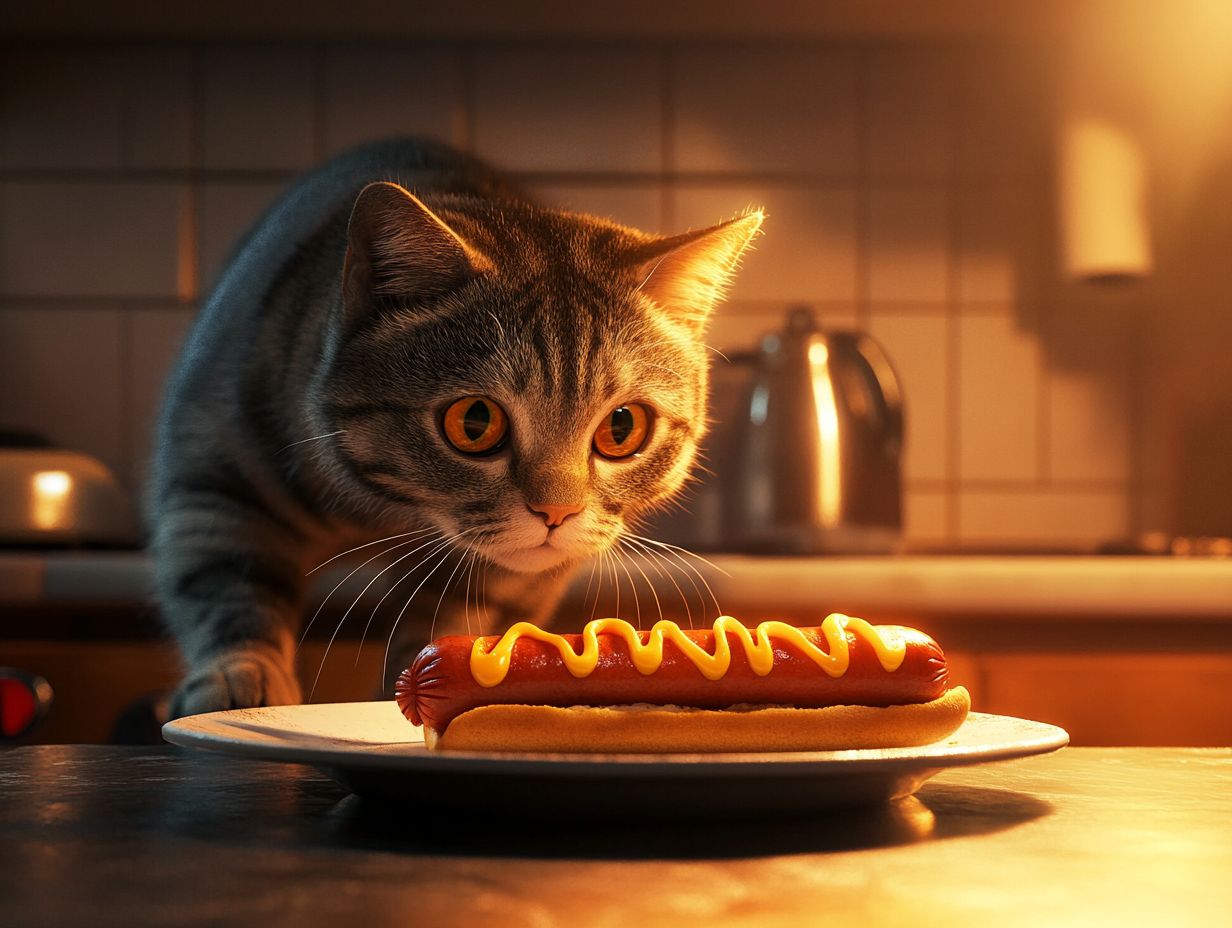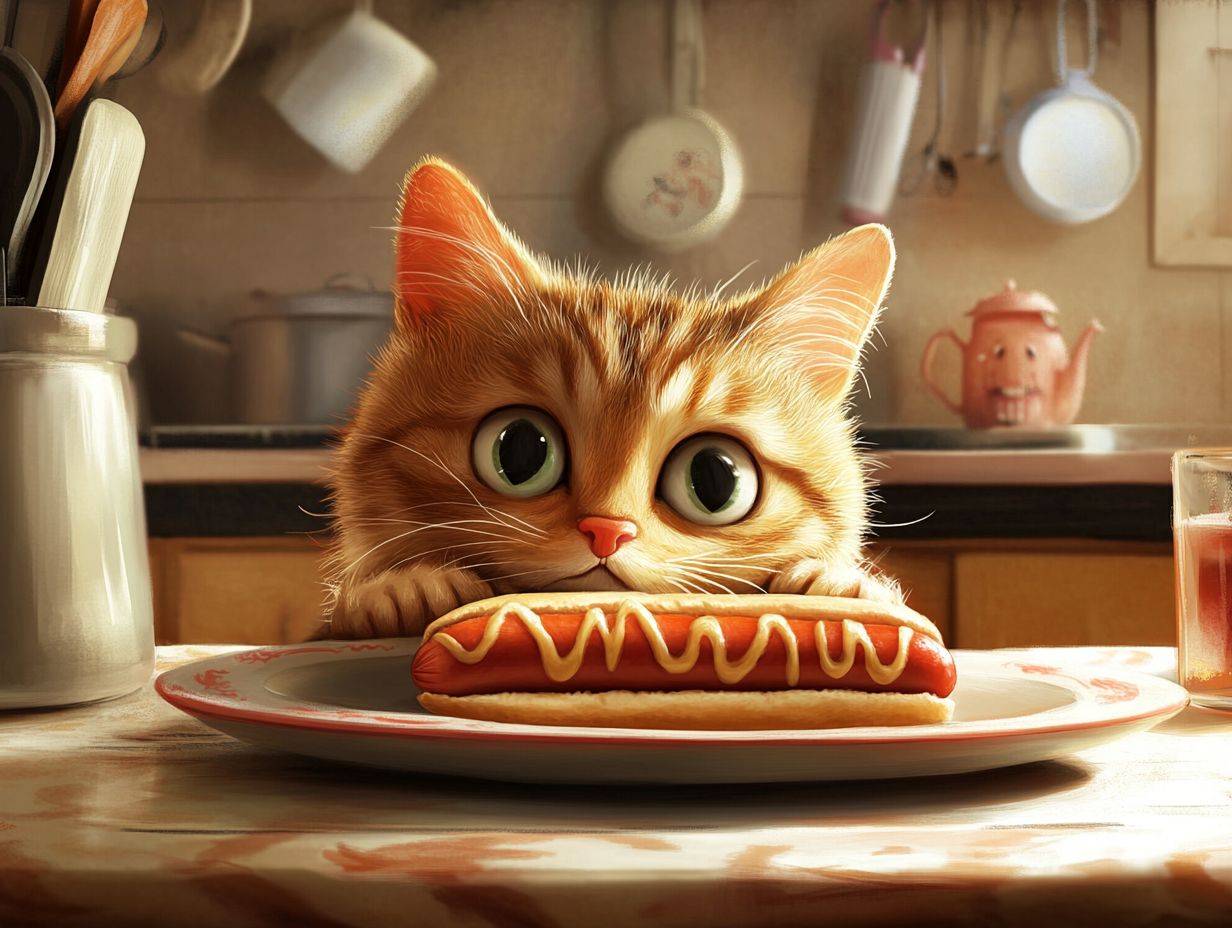While it may be tempting to share your favorite snack, hot dogs are not safe for cats. This article will inform you why hot dogs should be avoided in your cat’s diet and highlight healthier alternatives.
Many cat owners ask, “Can cats eat hot dogs?” While sharing meat may seem harmless, understanding your cat’s nutritional needs and the potential risks involved is important, especially when considering cat diet and nutrition.
This article explores whether hot dogs are a suitable snack for cats, highlights healthier alternatives like cooked lean meats, and offers guidelines for safe food sharing and preventing obesity. Read on to ensure your cat’s diet remains both tasty and safe!
Key Takeaways:

- Hot dogs are not suitable for cats due to high levels of sodium and fat, which do not meet their specific nutritional needs.
- Feeding hot dogs to cats can pose health risks such as gastrointestinal upset, pancreatitis, and choking hazards.
- Healthier alternatives for treats include cooked lean meats, fish, and safe fruits and vegetables. Avoid processed and high-fat foods like hot dogs.
Can Cats Eat Hot Dogs?
Cats and kittens are frequently offered a variety of foods by their owners, leading to the common question: can cats eat hot dogs? The answer is no, as hot dogs should not be a regular part of their diet due to high levels of sodium and fat. These ingredients can cause potential health issues for cats, who are strict carnivores.
Understanding proper feeding practices and the dietary needs of your cat can help ensure their health and well-being.
Understanding a Cat’s Nutritional Needs
A cat’s nutritional needs are essential for their health and longevity. As strict carnivores, cats require a diet high in protein and specific nutrients, such as taurine and essential fatty acids. They depend on animal-based proteins to fulfill their dietary requirements, making it crucial for pet owners to select cat food that meets veterinary standards.
A balanced diet should include high-quality protein sources, such as chicken, turkey, or fish, along with vitamins that support feline health. It’s important for owners to choose foods with minimal fillers and high protein content to avoid health issues like obesity or malnutrition.
When introducing new foods, monitor your cat for allergic reactions such as vomiting or diarrhea. Always consult with your veterinarian for personalized dietary advice.
Potential Risks of Feeding Hot Dogs to Cats
The risks of feeding hot dogs to cats include serious health issues due to high sodium and fat content. Potential complications can include vomiting, diarrhea, and pancreatitis.
Processed meats can contribute to obesity and gastrointestinal issues in cats. It’s crucial for owners to avoid these foods to protect their pets’ health.
Healthy Alternatives to Hot Dogs
If you’re looking for safe snacks for your cat, consider alternatives that are both nutritious and enjoyable. Offer small pieces of cooked chicken, turkey, or fish as treats—ideally no larger than a teaspoon each. Vegetables like carrots or peas can be given in small amounts, but always consult with your veterinarian before introducing new foods.
Conclusion
In conclusion, while hot dogs may be tempting, it’s essential to prioritize your cat’s health by providing safer, nutrient-rich treats and following veterinary guidelines. Understanding your cat’s dietary needs and opting for appropriate snacks can significantly enhance their overall well-being.
Processed meats like hot dogs often contain additives, preservatives, and excessive sodium, which can lead to long-term health issues such as obesity and hypertension. A balanced diet is vital for your cat’s health, and frequent indulgence in such foods can disrupt their nutritional balance. For more information, check out this article on whether it’s safe for cats to eat hot dogs.
Always monitor your cat closely for any adverse reactions and consult with a veterinarian to ensure that your dietary choices align with veterinary guidelines. By prioritizing whole, species-appropriate foods, you can significantly contribute to your feline companion’s health and longevity.
Sharing Food with Your Cat: Dos and Don’ts
Sharing human food with your cat can be an enjoyable experience, but it’s essential to understand the dos and don’ts to ensure their safety and health.
Guidelines for Safe and Healthy Sharing

“Safe Sharing: Guidelines for Healthy Sharing” provides an overview of important considerations for sharing food safely with a cat. The two primary parameters are ensuring the food is safe, human-grade and establishing a judicious treat schedule.
Safe Foods
Identify which types of food are safe for feline consumption. Lean proteins, such as cooked chicken or fish, along with certain vegetables, can be good choices. For instance, a small piece of cooked chicken (about a teaspoon) can be a safe treat. Always avoid harmful vegetables like onion and garlic and consult your veterinarian.
Foods to Avoid
Monitoring for any adverse reactions to newly introduced treats is essential for maintaining long-term health. It’s important to note that hot dogs are not suitable for cats and should be avoided.
Portion Sizes
A balanced treat schedule that considers caloric and nutritional requirements allows for guilt-free moments of sharing that align with the cat’s overall well-being.
Frequently Asked Questions
Can cats eat hot dogs? Is it safe for cats to eat hot dogs?
While cats can technically eat hot dogs, it is not recommended. Hot dogs contain high amounts of salt, preservatives, and other unhealthy ingredients that can be harmful.
What are the risks of cats eating hot dogs?
The risks of feeding hot dogs to cats include upset stomach, diarrhea, and potential pancreatitis. It’s crucial to follow proper feeding guidelines to prevent obesity.
What are some healthy alternatives to hot dogs for cats?
Cats can enjoy small amounts of cooked, unseasoned meats such as chicken, turkey, or fish as treats. Cat-friendly treats made specifically for their dietary needs are also good options.
Remember, always consult with a veterinarian for personalized advice on safe food sharing to ensure the best for your feline family member.
References
For further information on feline nutrition and safe food practices, consider consulting veterinary resources or articles from credible pet health websites.